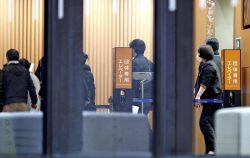14:59 JST, February 25, 2025
More than 20 years have passed since some of the Japanese nationals abducted by North Korea were able to return to Japan with their families. The remaining abductees and their families in Japan, who are waiting for their return, are growing older.
The government must act with a sense of urgency to resolve the situation.
Prime Minister Shigeru Ishiba has met with members of the association of families of abductees and conveyed his desire to hold a Japan-North Korea summit. The prime minister also revealed that at his recent summit with U.S. President Donald Trump, he asked Trump to bring up the abduction issue if a U.S.-North Korea summit were to take place, and the U.S. president agreed to do so.
Trump is known to have raised the issue when he met with Kim Jong Un, general secretary of the Workers’ Party of Korea, during his first term as U.S. president, at the request of then Prime Minister Shinzo Abe. Trump also condemned the abductions in his address to the U.N. General Assembly, saying they were an egregious human rights violation.
It is important for Japan to continue to apply pressure on North Korea — which stubbornly maintains its stance that the abduction issue has already been resolved — by getting the United States and other members of the international community involved.
The government has recognized 17 people as abductees. Five of them returned to Japan in 2002. Some of the abductees’ relatives returned to Japan in 2004, but there has been no progress since then.
Negotiations behind the scenes for former Prime Minister Fumio Kishida’s visit to North Korea were said to have reached a critical stage last spring, but they broke down reportedly because North Korea continued to demand that economic assistance be provided first.
The situation has now become even more complicated. Since last autumn, North Korea has been sending troops to Russia and has begun to take part in Moscow’s aggression against Ukraine. If Japan were to show a conciliatory attitude toward North Korea under the current circumstances, Tokyo could lose the trust of the international community.
Ishiba has long advocated a proposal to establish liaison offices in Tokyo and Pyongyang to facilitate opportunities for contact between Japan and North Korea. Last month, the prime minister has said at the Diet, “It would be effective to a certain extent.”
In 2004, North Korea promised to reinvestigate the issue of abductees, but it unilaterally declared in 2016 that it was suspending the investigation and has left the matter untouched since then.
There is no guarantee that setting up liaison offices would lead to the relaunch of the investigation or bring the abductees back to Japan. The establishment of liaison offices should not be used by North Korea to buy time or bring down the curtain on the issue.
North Korea might also take advantage of the weak position of Ishiba’s minority coalition government and try to shake the government by agreeing with Ishiba’s arguments. Close attention needs to be paid to North Korea’s every move.
Akihiro Arimoto, the father of Keiko Arimoto, who was 23 at the time of her abduction, has passed away. He was 96 years old. As a result, the only victim’s parent who is still alive is 89-year-old Sakie Yokota, the mother of Megumi Yokota, who was kidnapped at the age of 13. There is not much time left.
(From The Yomiuri Shimbun, Feb. 25, 2025)
Top Articles in Editorial & Columns
-

Riku-Ryu Pair Wins Gold Medal: Their Strong Bond Leads to Major Comeback Victory
-

China Provoked Takaichi into Risky Move of Dissolving House of Representatives, But It’s a Gamble She Just Might Win
-

University of Tokyo Professor Arrested: Serious Lack of Ethical Sense, Failure of Institutional Governance
-

Japan’s Plan for Investment in U.S.: Aim for Mutual Development by Ensuring Profitability
-

Policy Measures on Foreign Nationals: How Should Stricter Regulations and Coexistence Be Balanced?
JN ACCESS RANKING
-

Japan PM Takaichi’s Cabinet Resigns en Masse
-

Japan Institute to Use Domestic Commercial Optical Lattice Clock to Set Japan Standard Time
-

Israeli Ambassador to Japan Speaks about Japan’s Role in the Reconstruction of Gaza
-

Man Infected with Measles Reportedly Dined at Restaurant in Tokyo Station
-

Videos Plagiarized, Reposted with False Subtitles Claiming ‘Ryukyu Belongs to China’; Anti-China False Information Also Posted in Japan






















